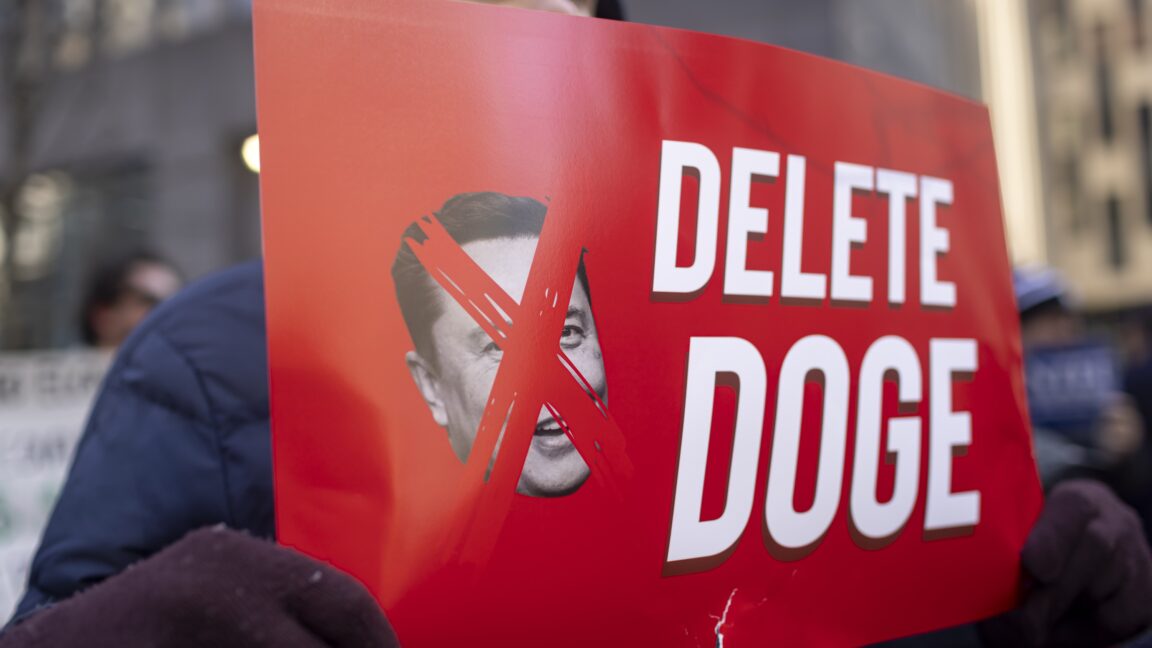Data for DOGE
After two court losses, DOGE asks Supreme Court for Social Security data access
Trump admin appeals to SCOTUS after two courts ruled DOGE can't access data.
Jon Brodkin
–
May 5, 2025 1:03 pm
|
53
A protest against President Donald Trump and Elon Musk in New York on February 19, 2025.
Credit:
Getty Images | Pacific Press
A protest against President Donald Trump and Elon Musk in New York on February 19, 2025.
Credit:
Getty Images | Pacific Press
Text
settings
Story text
Size
Small
Standard
Large
Width
*
Standard
Wide
Links
Standard
Orange
* Subscribers only
Learn more
Minimize to nav
The Trump administration filed an emergency application on Friday asking the Supreme Court to restore DOGE's access to Social Security Administration records. A lower-court order that prohibited DOGE's access is causing "irreparable harm to the executive branch" and thwarting DOGE's attempts to "eliminate waste and fraud," US Solicitor General John Sauer wrote in the appeal.
"The government cannot eliminate waste and fraud if district courts bar the very agency personnel with expertise and the designated mission of curtailing such waste and fraud from performing their jobs," Sauer told the Supreme Court. The preliminary injunction that is currently in place halted "the Executive Branch's critically important efforts to improve its information-technology infrastructure and eliminate waste," the brief said.
The appeal was lodged in a case filed by the American Federation of State, County and Municipal Employees; the Alliance for Retired Americans; and American Federation of Teachers. Chief Justice John Roberts asked them to file a response to the US by May 12.
In March, the plaintiffs obtained an order that required the Social Security Administration (SSA) to block DOGE's access to records. US District Judge Ellen Lipton Hollander's order said the DOGE entity created by President Donald Trump "is essentially engaged in a fishing expedition at SSA, in search of a fraud epidemic, based on little more than suspicion."
Trump admin lost at appeals court
Hollander ordered the SSA to cut off DOGE's access and ruled that Elon Musk and other DOGE members must "disgorge and delete all non-anonymized PII [personally identifiable information] data in their possession or under their control." The District of Maryland judge found that Social Security officials "provided members of the SSA DOGE Team with unbridled access to the personal and private data of millions of Americans, including but not limited to Social Security numbers, medical records, mental health records, hospitalization records, drivers' license numbers, bank and credit card information, tax information, income history, work history, birth and marriage certificates, and home and work addresses."
Before turning to the Supreme Court, the Trump administration went to the US Court of Appeals for the Fourth Circuit and sought an order to stay the lower-court ruling pending appeal. The appeals court voted 9–6 on April 30 to deny the government's motion.
Sauer's appeal to the Supreme Court was filed on behalf of the SSA, the Department of Government Efficiency (DOGE), DOGE Acting Administrator Amy Gleeson, and Musk, who is described in the brief as "senior advisor to the president." Sauer asked the Supreme Court to stay Hollander's injunction and grant "an immediate administrative stay of the district court's order pending the Court's consideration of this application."
"This emergency application presents a now-familiar theme: a district court has issued sweeping injunctive relief without legal authority to do so, in ways that inflict ongoing, irreparable harm on urgent federal priorities and stymie the Executive Branch's functions," Sauer wrote.
No “concrete injury,” US says
Sauer argued that the organizations suing the government lack standing because their "members furnished their information with the understanding that government employees could access it for a number of purposes, as those employees are permitted to do pursuant to various exceptions in the Privacy Act of 1974." The US brief said the plaintiffs' members "cannot plausibly claim any concrete injury from having particular agency employees—i.e., members of the SSA DOGE team—access their information when those employees are subject to the same legal and ethical obligations against further dissemination that bind all agency employees."
Hollander wrote in March that the government "never identified or articulated even a single reason for which the DOGE Team needs unlimited access to SSA's entire record systems, thereby exposing personal, confidential, sensitive, and private information that millions of Americans entrusted to their government."
In the 4th Circuit's 9–6 ruling against the Trump administration, the majority was composed of judges appointed by Democratic presidents while the judges in the minority were appointed by Republicans. An opinion signed by seven of the circuit judges who voted to uphold the lower-court ruling said that "the very able district judge has carefully and thoughtfully examined the evidence and the legal issues" and found that "the evidence demonstrates that DOGE's work could be accomplished largely with anonymized and redacted data, along with discrete pieces of non-anonymized data in limited, appropriate circumstances—as has long been typical at SSA for the type of technology upgrades and waste, abuse, and fraud detection that DOGE claims to be doing."
“Need” to know
DOGE members were granted data access without being hired by the SSA and without passing background checks, the circuit judges wrote.
"Moreover, the evidence shows that DOGE's unfettered access exceeded that allowed to all but the few most experienced and trusted SSA employees; that such access contravened SSA policy and practices of access limitations and separation of duties; and that DOGE affiliates were granted unfettered access without being properly hired by or detailed to SSA, without standard training, and without mandated background investigations," the opinion said.
The Privacy Act states that a federal agency may disclose records "to those officers and employees of the agency which maintains the record who have a need for the record in the performance of their duties." Sauer argued that Hollander overstepped her authority when determining that DOGE members didn't need the records.
"That standard is clearly met here; employees charged with modernizing government information systems and routing [sic] out fraud, waste, and abuse in data systems plainly need access to those systems," he wrote. "Yet the district court instead viewed agency employees within the SSA DOGE team as the equivalent of intruders who break into hotel rooms. District courts should not be able to wield the Privacy Act to substitute their own view of the government's 'needs' for that of the President and agency heads."
Jon Brodkin
Senior IT Reporter
Jon Brodkin
Senior IT Reporter
Jon is a Senior IT Reporter for Ars Technica. He covers the telecom industry, Federal Communications Commission rulemakings, broadband consumer affairs, court cases, and government regulation of the tech industry.
53 Comments










